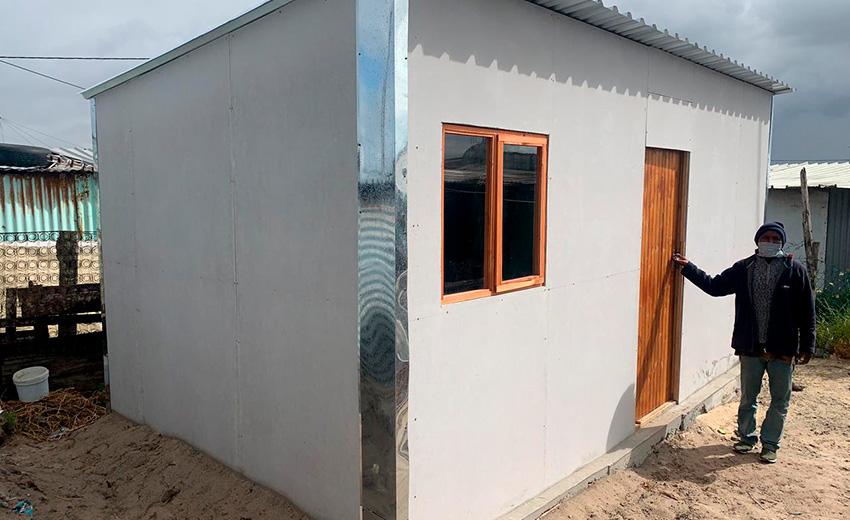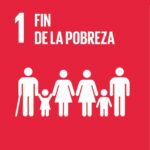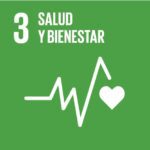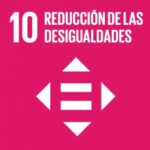A Response to Covid19 an extreme social emergency
This month, we want to highlight a project implemented by the organisation Ikhalayami in South Africa. The aim of this urban project aimed at replacing the abandoned, dilapidated and rotting structures of 80 extremely poor families with 80 durable 20 square metre shelters that are fire and flood resistant, easy to transport and quick to build.
RESPONSIBLE NGO
Ikhayalami Development Services
TYPE OF SOLUTION
| PLACE OF EXECUTION Cape Town, South Africa |
BENEFICIED FAMILIES 18 |
| CONTINENT America |
BENEFICIARIES 80 |
| RESPONSIBLE NGO Ikhayalami Development Services |
PROGRESS 100% finished |
| YEAR OF EXECUTION 2021 |
EXECUTION TIME … |
Costs
- SELAVIP's contribution
$70.000 USD - Other contributions
$16.000 USD - TOTAL COST PROJECT
$86.000 USD - UNIT COST PER FAMILY
$1.075 USD
Download
This month, we want to highlight a project implemented by the organisation Ikhalayami in South Africa. The aim of this urban project aimed at replacing the abandoned, dilapidated and rotting structures of 80 extremely poor families with 80 durable 20 square metre shelters that are fire and flood resistant, easy to transport and quick to build. The families have been squatting on state owned land (each of the identified settlements where the project was executed have been in existence for over 20 years and it is important to know that the South African constitution protects the rights of squatters in that it is very difficult for government to attain a court order for an eviction).
The organisation was inspired by the Hogar de Christo model in Chile and the ideas of SELAVIP's founder, father Josse van der Rest sj. It has since adapted and applied it to South African conditions. The Ikhayalami's philosophy is that a rudimentary shelter, improved and built quickly, is an essential means of improving the lives and well-being of the poorest of the poor.
In implementing the project (supported by the company ETEX with internal and external cladding), the organisation worked closely with Sikhona Nathi (their community development partner) who prepared the beneficiary families for the construction process.
Once the dimensions of the structures had been confirmed, Ikhayalami's construction team sourced the necessary building materials, prefabricated the structures in Ikhayalami's factory (the offices and production site are located at the junction of two of Cape Town's largest deprived neighbourhoods) and then transported them to the site to erect the new homes. Each new house took a day to build. The families demolished their rotting old shacks in the early hours of the morning (with the help of Sikhona Nathi representatives). By the time the Ikhayalami construction team arrived on site, the spaces had been cleared so that the team could start erecting the new houses. At the end of the afternoon, the families were able to reoccupy their improved shelters.
The materials used by the organisation are as follows:
Floor: Cement screed
Walls: Treated timber frame clad with zinc/aliminium 05mm thick concealed sheeting
Roof: Treated roof trusses and 0.4mm thick galvanized zinc sheeting.
South Africa
-
Capital
Cape Town, Pretoria, Bloemfontein
-
Continent
Africa
-
Population
57,516,665 (2022 est.)
-
Languages
isiZulu (oficial), isiXhosa (oficial), Africaans 12.2%, Sepedi (oficial), etc.
-
Currency
ZAR
-
Government system
Parliamentary Republic
-
Borders
Botswana; Lesotho; Mozambique; Namibia; Eswatini; Zimbabwe
-
Area
1,214,470 sq km
-
Percentage of people living in urban areas
68.8% of total population (2023)
-
Yearly inflation
29,81 % (2022)
-
Unemployment rate
32.9 %
-
GDP Per Capita
USD 7,055 (2021))
-
Approx. Monthly Minimum Salary
7,880 ZAR per month (USD 405)
-
HDI (Human Development Index)
0,385
-
% of Population living under The Poverty Line
55 %












